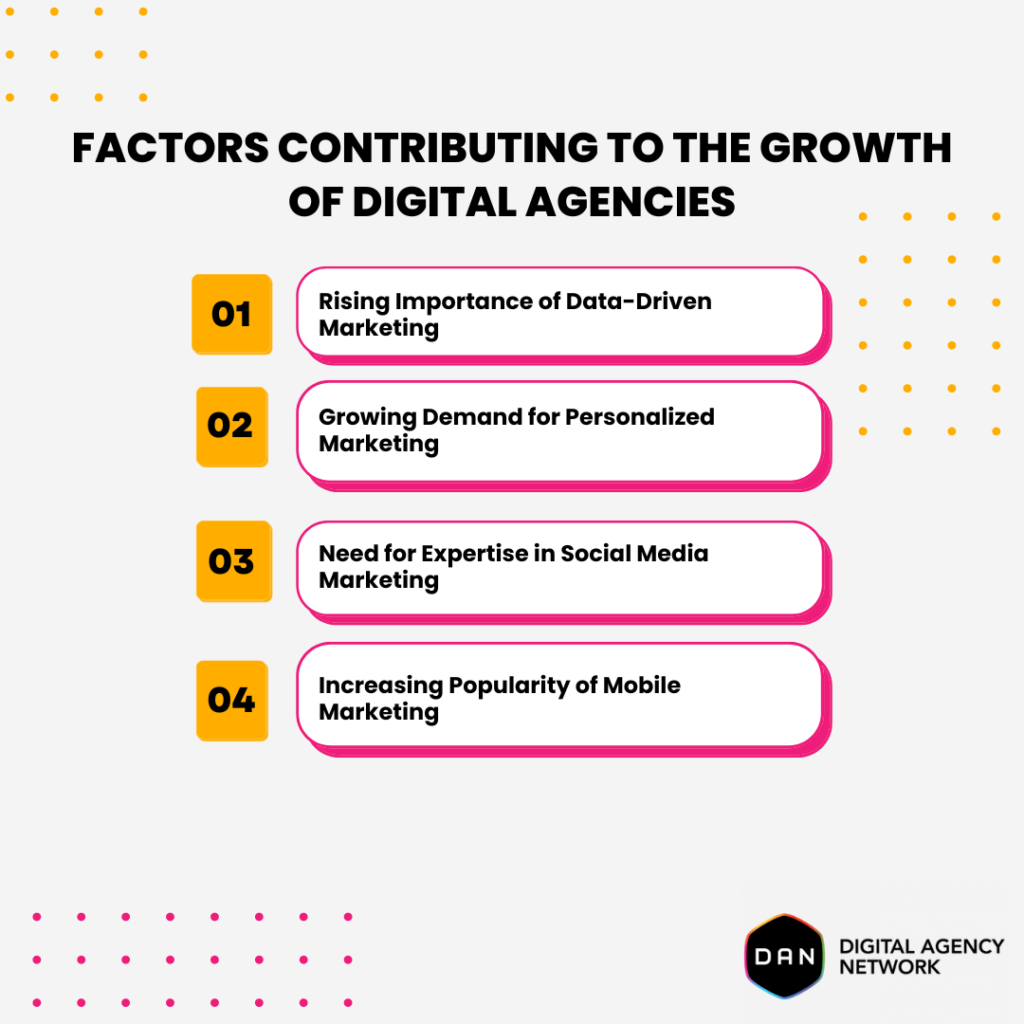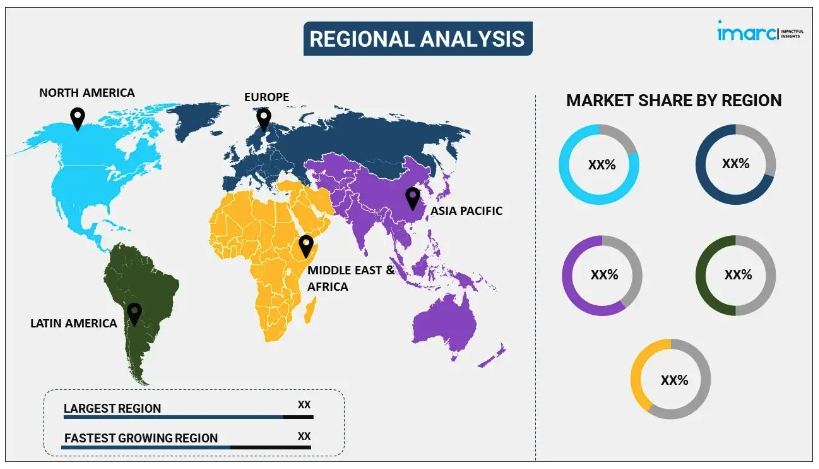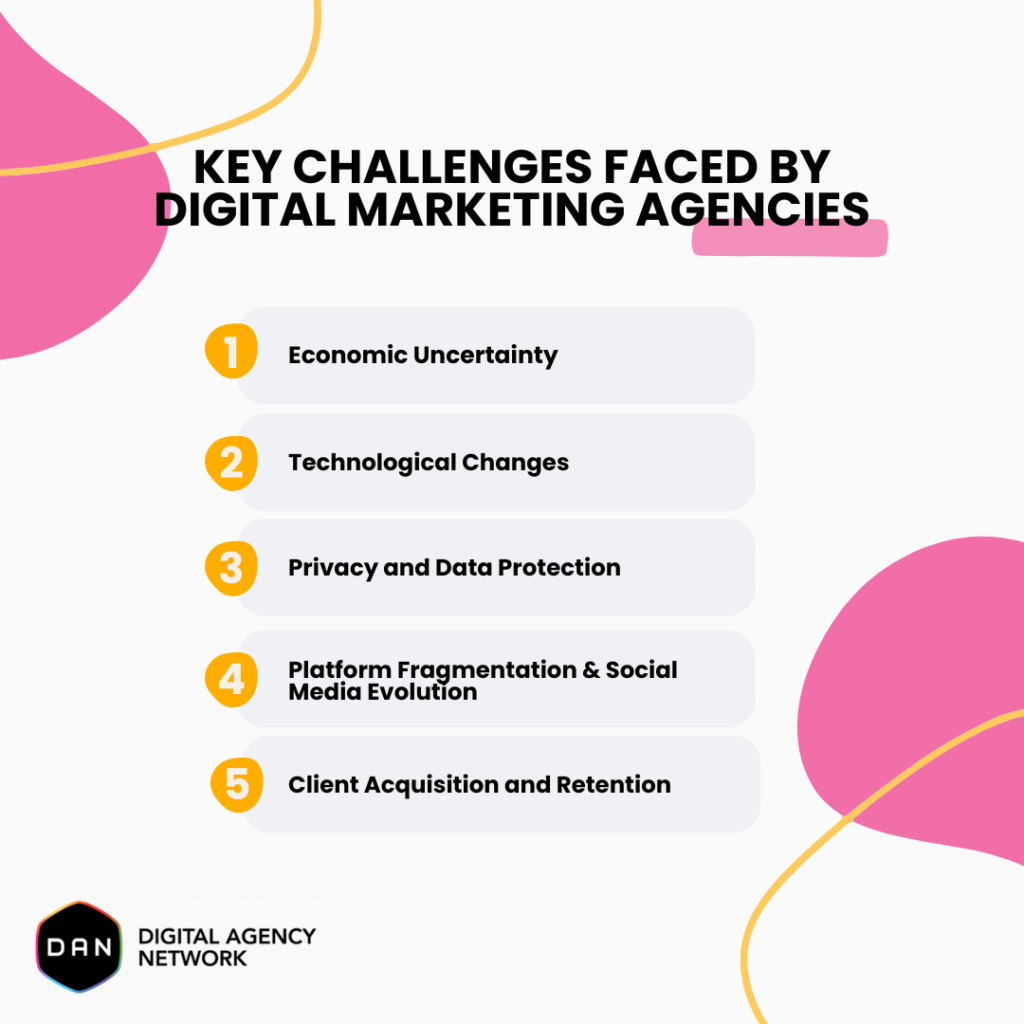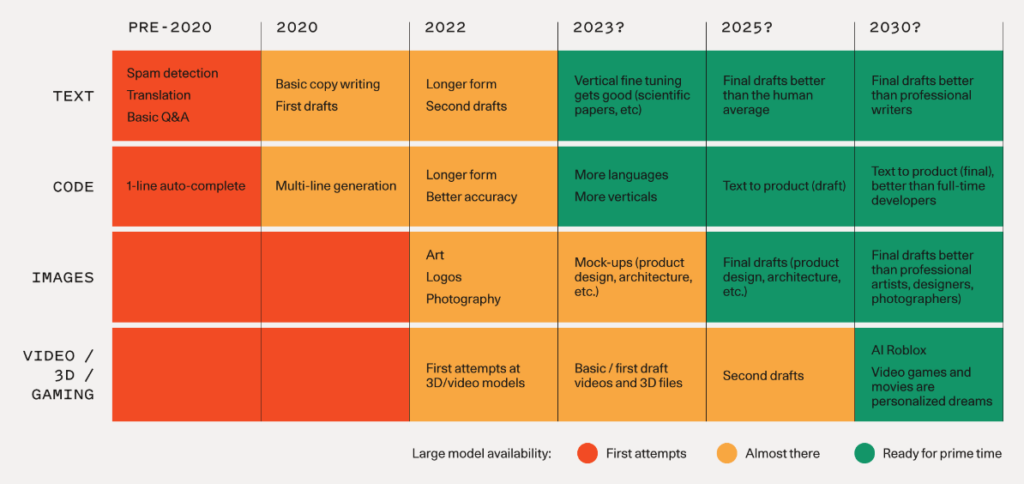Digital Marketing Agency Market Size: A Complete Breakdown by Niche & Service
Businesses are investing more in digital marketing services to assist them with their digital marketing demands in order to remain competitive. With that high in demand, the digital marketing agency market size is also expanding globally, making it highly...

Businesses are investing more in digital marketing services to assist them with their digital marketing demands in order to remain competitive. With that high in demand, the digital marketing agency market size is also expanding globally, making it highly essential to understand the numbers and trends that define this dynamic industry. In fact, the global digital marketing market size is expected to be worth around $1,310.3 billion by 2033. Today, with an estimated $52.4 billion in the digital advertising agencies market in 2024, the United States leads the world.
In this article, we’ll delve into the digital marketing agency market size, analyzing both the overall landscape and the market size within each digital marketing niche.
An Analysis of the Digital Marketing Agency Market Size
As mentioned above, the digital marketing agency market size has seen significant growth in recent years. This impressive growth is driven by increased digitalization, the proliferation of social media platforms, and businesses’ growing reliance on online marketing strategies.

Factors that are contributing to the growth of digital agencies include:
The increasing importance of data-driven marketing The growing demand for personalized marketing The need for agencies that can help businesses with their social media marketing The increasing popularity of mobile marketingBut what does this growth look like in practice? Let’s take a closer look.
Segmenting the Digital Agencies Market Size by Service
There are different types of digital marketing agencies, full-size or specialized agencies to be exact. Each offers a different list of digital marketing services, some specializing in different niches. Let’s explore these services and understand their impact on the market.
SEO and Content Marketing Agencies
SEO and content marketing agencies are an integral part of the whole digital marketing ecosystem. In 2023, the SEO market size alone was estimated at $75.13 billion. Content marketing, closely tied to SEO, is projected to generate $2 trillion by 2032. The demand for high-quality, optimized content is driving this growth because although Generative AI tools are used daily, AI-generated content doesn’t really provide benefit due to Google’s counter algorithm changes against the increasing use of AI. Google’s E-E-A-T rules and ever-changing algorithms require experience, expertise, authority and trustworthiness in each content created.
It is estimated that SEO agencies will experience a 20% increase in the near future, slightly lower than the overall growth rate of digital agencies, as SEO is a more specialized service.
The United States is home to the largest number of digital SEO agencies, with an estimated 3,600 businesses in this sector. Other major markets for digital SEO agencies include the United Kingdom, Canada, Australia, and Germany.
Social Media Marketing Agencies
Social media marketing has become indispensable for brands aiming to engage with their audiences. The global social media marketing market is projected to grow from $28.49 billion in 2024 to $134.07 billion by 2032. These agencies provide social media campaign services to increase engagement and brand awareness. Social media marketing agencies’ services include content creation, social media advertising, and influencer marketing.
PPC and Online Advertising Agencies
Pay-per-click (PPC) and online advertising agencies are also critical for brands looking to maximize their online presence. PPC agencies manage PPC campaigns across platforms like Google Ads, focusing on keyword bidding, ad creation, and campaign optimization to drive traffic and conversions. According to Dentsu, Media inflation is predicted to fuel a 4.6% growth in global advertising spending in 2024, bringing the total to US$752.8 billion. This market is dominated by Google Ads and Facebook Ads, which offer businesses strong online advertising platforms.
Web Design and Development Agencies
Agencies specializing in creating responsive, user-friendly websites are in high demand. It is safe to say that it doesn’t seem hard to get clients for digital marketing in the future, especially if you’re an agency specializing in one of the services we mention throughout the article. The web design and development market is also witnessing substantial growth. Valued at approximately $64.7billion in 2023, the web design and development market is projected to grow to $123.2 billion by 2032. In the United States, the web design services industry alone is valued at about $40.8 billion as of 2024.
Growth drivers for this market are:
eCommerce Expansion Mobile Optimization Technological AdvancementsEmail Marketing Agencies
Though often seen as a “step-sibling” in the marketing world, email marketing remains a powerful tool for customer engagement and retention. The email marketing market industry is projected to grow from $1.8 billion in 2023 to $4.2 billion by 2032.
Segmentation of Digital Marketing Agencies by Niche
Imagine a marketplace filled with businesses, each with its own unique voice and audience. Here’s where digital agencies come in, acting as skilled guides. Yes, they specialize in specific services like SEO, social media, or content creation; however, their expertise goes beyond that. These digital marketing agencies understand the distinct needs of different industries, the “niches” within the market.
Digital marketing companies become more than just service providers by specializing in various niches; they become industry specialists who customize their strategies to the particular opportunities and problems that each company they work with faces.
Healthcare: A healthcare marketing agency wouldn’t just blast out generic ads. They’d craft informative content marketing campaigns and patient engagement strategies to build trust and educate potential patients. Agencies focusing on healthcare must navigate strict regulations and compliance requirements. They often provide services like patient engagement strategies, healthcare SEO, and content marketing that comply with healthcare laws.
Real Estate: Using social media sites like Facebook and Instagram, real estate marketing agencies are experts in advertising real estate services, open houses, and property listings. They frequently make use of virtual reality and video tours.
E-commerce: An eCommerce agency focuses on conversion optimization and paid advertising, ensuring customers navigate seamlessly from browsing to buying. They work strategically to drive online sales through social media marketing, PPC advertising, and email campaigns specific to online retail dynamics.
Legal: In order to assure accuracy and compliance, legal marketing agencies frequently use attorney-written content. They also offer specific services like SEO, PPC, and content development. Their primary focus is on the particular regulatory environment of the legal industry.
Evaluating the Digital Marketing Agency Market Size by Service Offering
Let’s take a moment to zoom in on the services that are driving the market forward.
Comprehensive Digital Marketing Services
Full-service digital marketing companies handle all aspects of digital marketing and provide a wide range of services. In fact, by the end of 2025, it is expected that the market would generate $906.8 billion in revenue, reflecting a growing preference for agencies that can handle multiple facets of digital marketing.
Specialized Digital Marketing Services
Specialized digital marketing services, such as influencer marketing and video marketing, are also gaining traction. The influencer marketing market alone was estimated to reach a record of $24 billion in 2024. Video marketing, driven by platforms like YouTube and TikTok, is another rapidly growing niche.
Regional Insights into the Digital Marketing Agencies Market Size
Now, it’s time to assess the digital marketing agencies market size by each region. The global digital marketing industry growth is increasing across all regions. North America and Asia-Pacific are leading the charge with significant investments and technological advancements. The continuous evolution of digital marketing tools and strategies across these regions promises sustained growth and new opportunities for digital marketing agencies globally.

North America
North America remains a leading market for digital marketing agencies. In 2022, North America accounted for more than 32% of the global digital advertising market, driven by high smartphone usage and the popularity of mobile streaming services like Hulu, Amazon Prime, and Netflix. The region’s technological infrastructure and the growing demand for e-commerce platforms have created lucrative opportunities for digital marketing agencies.
In 2023, the region’s market size was valued at $120 billion, with the United States accounting for a significant portion. Key trends include the rise of AI-driven marketing tools and increased spending on digital advertising.
Europe
Europe is particularly noted for the significant uptake of real-time bidding (RTB) for online advertisements and the consumption of video and rich media ads. The market is growing, with major digital marketing hubs like London, Berlin, and Paris driving this growth. The market is expected to continue its expansion as businesses invest more in digital marketing to enhance customer engagement. Trends in Europe include a focus on data privacy and the adoption of GDPR-compliant marketing strategies.
Asia-Pacific
The market for digital advertising is expected to expand by 6.58% between 2024 and 2028, reaching a value of US$332.0 billion in the Asia-Pacific region.
Leading nations in digital marketing are China, India, and Japan, which take advantage of their large populations and rising internet usage rates. Additionally advantageous to the area is the strong presence of industry leaders like Baidu, Tencent, and Alibaba, which drive innovation in digital marketing.
Latin America
According to the latest official data, there are 4,551 advertising companies in Mexico. By 2024, it is anticipated that Latin America’s total digital advertising spend would surpass US$14.5 billion. Leading the way in this expansion are Brazil and Mexico, where companies are using digital channels more and more to connect with their target markets.
Middle East and Africa
There is no exception to the rising trend of digital advertising spending in the Middle East and North Africa (MENA) area. By 2024, internet ad spending in the MENA is projected to reach a total of $7.9 billion, up from approximately $4.4 billion in 2020. However, these regions still face challenges such as lower internet penetration rates and economic instability compared to more developed regions.
Key Challenges Faced by Digital Marketing Agencies
As we explore the increasing digital marketing agency market, we should also acknowledge the challenges digital marketing agencies face.
 Economic Uncertainty: Global economic instability, driven by factors like geopolitical conflicts, inflation, and fluctuating interest rates, poses a significant challenge. Businesses often reduce marketing budgets in uncertain times, impacting digital marketing agencies’ revenue and making it challenging to grow a digital agency.
Technological Changes: Keeping up with the fast-paced advancements in technology, particularly AI, augmented reality (AR), and virtual reality (VR), is challenging. Agencies must continually invest in learning and integrating new technologies to stay competitive and meet client expectations.
Privacy and Data Protection: Increasing privacy regulations, such as GDPR in Europe and CCPA in California, are making data collection and usage more complex. As a result, digital marketing companies have to make sure that compliance is maintained while still successfully identifying and interacting with customers.
Platform Fragmentation and Social Media Evolution: The constant emergence of new social media platforms and changes to existing ones create challenges in strategy and resource allocation.In addition to choosing which platforms to invest in, agencies also need to determine how to adjust to shifts in user behavior and platform algorithms.
Client Acquisition and Retention: Acquiring new clients remains a top challenge, as competition intensifies and client expectations rise. Retaining clients also requires continuous demonstration of value through effective communication, transparency, and consistent performance.
Economic Uncertainty: Global economic instability, driven by factors like geopolitical conflicts, inflation, and fluctuating interest rates, poses a significant challenge. Businesses often reduce marketing budgets in uncertain times, impacting digital marketing agencies’ revenue and making it challenging to grow a digital agency.
Technological Changes: Keeping up with the fast-paced advancements in technology, particularly AI, augmented reality (AR), and virtual reality (VR), is challenging. Agencies must continually invest in learning and integrating new technologies to stay competitive and meet client expectations.
Privacy and Data Protection: Increasing privacy regulations, such as GDPR in Europe and CCPA in California, are making data collection and usage more complex. As a result, digital marketing companies have to make sure that compliance is maintained while still successfully identifying and interacting with customers.
Platform Fragmentation and Social Media Evolution: The constant emergence of new social media platforms and changes to existing ones create challenges in strategy and resource allocation.In addition to choosing which platforms to invest in, agencies also need to determine how to adjust to shifts in user behavior and platform algorithms.
Client Acquisition and Retention: Acquiring new clients remains a top challenge, as competition intensifies and client expectations rise. Retaining clients also requires continuous demonstration of value through effective communication, transparency, and consistent performance.
Future Trends and Predictions for the Digital Marketing Agency Market
Emerging technologies like artificial intelligence, machine learning, and blockchain are set to revolutionize the digital marketing agency market. By 2030, these technologies could drive the market size to new heights, enabling more personalized and efficient marketing strategies.
Artificial Intelligence (AI) and Machine Learning (ML) Integration: Digital marketing is undergoing a transformation due to AI and ML, which make campaigns more effective and customized. These technologies improve the accuracy and efficacy of advertising campaigns by enabling real-time data analysis, predictive analytics, and automation of tasks. AI-driven tools are now necessary for consumer segmentation, performance tracking, and content creation. In the near future, it’s getting more likely that AI will be able to handle a large portion of the execution task.
Here’s Sequoia’s forecast:

Voice Search and Natural Language Processing (NLP): Optimizing for voice search is crucial since speech-activated assistants, such as Google Assistant and Alexa, are becoming more popular. Marketers need to focus on long-tail keywords, natural language queries, and local SEO to ensure content discoverability through voice searches. This trend will continue to grow as more consumers rely on voice-activated devices.
Interactive and Immersive Content: Traditional content marketing is evolving into more interactive forms, such as polls, quizzes, and augmented reality (AR) experiences. These formats engage users more deeply and provide valuable insights into consumer behavior. Additionally, AR and virtual reality (VR) are being used to create immersive experiences, particularly in industries like fashion and home decor, where virtual try-ons and visualizations enhance customer engagement.
Video Marketing Dominance: Video content remains a dominant force in digital marketing. Platforms like TikTok, Instagram Reels, and YouTube are central to marketing strategies due to their high engagement rates. Live streaming, 360-degree videos, and virtual events are also gaining traction, providing brands with new ways to connect with audiences. Video content is projected to continue growing, with innovations in format and delivery making it a critical component of digital marketing campaigns.
Personalization at Scale: Advancements in AI and data analytics are enabling marketers to achieve personalization at scale. Marketers are able to provide recommendations and information that is highly customized by examining user behavior, interests, and previous interactions. An important event for those who want to build stronger connections.
Blockchain Technology: Blockchain is emerging as a significant trend in digital marketing due to its ability to provide transparency and security in advertising transactions. It helps address issues like ad fraud and ensures that marketers’ investments reach their intended audiences. As concerns about data privacy grow, blockchain’s role in digital advertising is expected to expand.
Inclusive and Sustainable Marketing: Inclusivity and sustainability – two popular keywords that emerged for the past years. Consumers are increasingly drawn to brands that authentically represent diverse voices and commit to sustainable practices.
Conclusion
The digital marketing agency world is growing fast, with lots of exciting opportunities in every niche. From SEO and content marketing to social media and PPC, each area is seeing significant growth. As the market changes, staying informed will help you get ahead.

 UsenB
UsenB 































